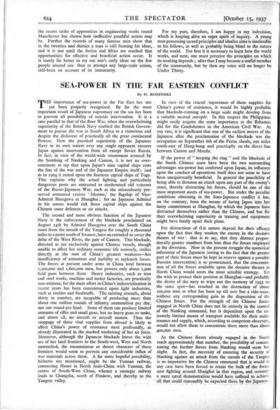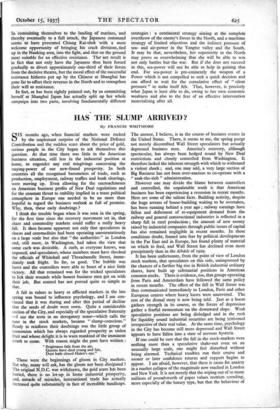SEA-POWER IN THE FAR EASTERN CONFLICT
By H. ROSINSKI
THE importance of sea-power in the Far East has not yet been properly recognised. By far the most important result of Japanese supremacy on the sea has been to prevent all possibility of outside intervention. It is a case parallel to that of the Boer War, when the overwhelming superiority of the British Navy enabled the British Govern- ment to pursue the war in South Africa to a victorious end despite the disfavour of practically all the great continental Powers. Now the practical superiority of the Japanese Navy in its own waters over any single opponent ensures Japan against intervention from all except Soviet Russia. In fact, in view of the world-wide resentment aroused by the bombing of Nanking and Canton, it is not an over- statement to say that upon Japan's nine capital ships rests the fate of the war and of the Japanese Empire itself; just as in 1904 it rested upon the fourteen capital ships of Togo. This explains why the actual fighting and particularly dangerous posts are entrusted to modernised old veterans of the Russo-Japanese War, such as the miraculously pre- served armoured cruiser Idzumo,' the flagship of Vice- Admiral Hasegawa at Shanghai ; for no Japanese Admiral in his senses would risk those capital ships against the Chinese coast defences or air attacks.
The second and more obvious function of the Japanese Navy is the enforcement of the blockade proclaimed on August 24th by Admiral Hasegawa over the South China coast from the mouth of the Yangtse for roughly a thousand miles to a point south of Swatow, later on extended to cover the delta of the West River, the gate of Canton. This blockade, directed as yet exclusively against Chinese vessels, though unable to affect her ordinary economic life seriously, strikes directly at the root of China's greatest weakness—her insufficiency of armament and inability to replenish losses. The forces at present under arms in China total between 1,2oo,000 and 1,600,00o men, but possess only about i,000 field guns between them. Heavy industries, such as iron and steel works, machine and motor factories, are practically non-existent, for the main effort in China's industrialisation in recent years has been concentrated upon light industries, such as textiles and foodstuffs. The existing arsenals, about thirty in number, are incapable of producing more than about one million rounds of infantry ammunition per day, not one round per head. Some of them can produce limited amounts of rifles and small guns, but no heavy guns or tanks, and above all, no aircraft or aircraft motors. Thus the stoppage of these vital supplies from abroad is likely to affect China's power of resistance most profoundly, as already illustrated in the marked weakening of her air force. Moreover, although the Japanese blockade leaves the wide arc of her land frontiers to the South-west, West and North unwatched, the mountainous or desert character of those frontiers would seem to prevent any considerable influx of war materials across them. A far more hopeful possibility, hitherto not mentioned, might be the Yunnan railway, connecting Hanoi in North Indo-China with Yunnan, the centre of South-West China, whence a strategic railway leads to Changsha, south of Hankow, and thereby to the Yangtse valley. In view of the crucial 'mportance of these supplies for China's power of resistance, it would be highly probable that blockade-running on a large scale might develop from a suitable neutral entrepot. In this respect the Philippines might easily acquire the same importance as the -Bahamas did for the Confederates in the American Civil War. At any rate, it is significant that one of the earliest moves of the Japanese after the proclamation of the blockade was the occupation on September 6th of the Pratas shoals, 200 miles south-east of Hong-kong and practically on the direct line between Canton and Manila.
If the power of "keeping the ring" and the blockade of the South Chinese coast have been the two outstanding advantages sea-power has conferred upon Japan, its influence upon the conduct of operations itself does not seem to have been unequivocally beneficial. In general the possibility of being able to threaten an attack upon any part of the enemy's coast, thereby distracting his forces, should be one of the most important assets of sea-power. But under the peculiar conditions obtaining in the Sino-Japanese conflict it has, on the contrary, been the means of luring Japan into her hasty commitment at Shanghai, by which the Japanese have distracted themselves rather than the Chinese, and but for their overwhelming superiority in mining and equipment might have fatally upset their plans.
For distractions of this nature depend for their efficacy upon the fact that they weaken the enemy. _in the decisive theatre of war : that is to say, that they distract propor- tior ally greater numbers from him than the forces employed in the diversion. Now in the present struggle-the numerical inferiority of the Japanese (owing to the fact that the greater part of their forces must be kept in reserve against a possible Russian intervention) is so pronounced, that the concentra- tion of all the forces available upon the decisive theatre in North China would seem the most sensible strategy. Yet the wish to protect their position at Shanghai—and probably the desire of the navy to wipe out the memory of 1932 on the same spot—has resulted in the distraction of about too,000 men to what has been up till now but a side-issue, without any corresponding gain in the disposition of the Chinese forces. For the strength of the Chinese forces engaged in North China does not lie entirely in the control of the Nanking command, but is dependent upon the ex- tremely limited means of transport available for their main- tenance and supply, which, according to competent observers, would not allow them to concentrate there more than about 400,000 men.
As the Chinese forces already engaged in the North reach approximately that number, the possibility of concen- trating the further forces from Nanking would seem but slight. In fact, the necessity of ensuring the security of Nanking against an attack from the mouth of the Yangtse is so imperative for the Chinese command that it would in any case have been forced to retain the bulk of the forces now fighting around Shanghai in that region, and certainly a mere naval demonstration would have sufficed to achieve - all that could reasonably be expected there by the Japanese. . _ _ In committing themselves to the landing of marines, and thereby eventually to a full attack, the Japanese command seems to have presented Chiang Kai-shek with a most welcome opportunity of bringing his crack divisions, tied up in the Nanking area, into the fight, and that on the ground most suitable for an effective resistance. The net result is in fact that not only have the Japanese thus been forced gradually to divert approximately one-third of their forces from the decisive theatre, but the moral effect of the successful resistance hitherto put up by the Chinese at Shanghai has gone far to offset their reverses in the North and to strengthen their will to resistance.
In fact, as has been rightly pointed out, by so committing herself at Shanghai Japan has actually split up her whole campaign into two parts, involving fundamentally different strategies : a continental strategy aiming at the complete overthrow of the enemy's forces in the North, and a maritime strategy of limited objectives and the indirect pressure of sea- and air-power in the Yangtse valley and the South. It may be that, nevertheless, her superiority in the North may prove so overwhelming that she will be able to win not only battles but the war. But if she does not succeed in this, sea-power will not be able to help in gaining that end. For sea-power is pre-eminently the weapon of a Power which is not compelled to seek a quick decision and can afford to wait for the cumulative effect of "silent pressure" to make itself felt. That, however, is precisely what Japan is least able to do, owing to her own economic weakness and also to the fear of an effective intervention materialising after all.























































 Previous page
Previous page